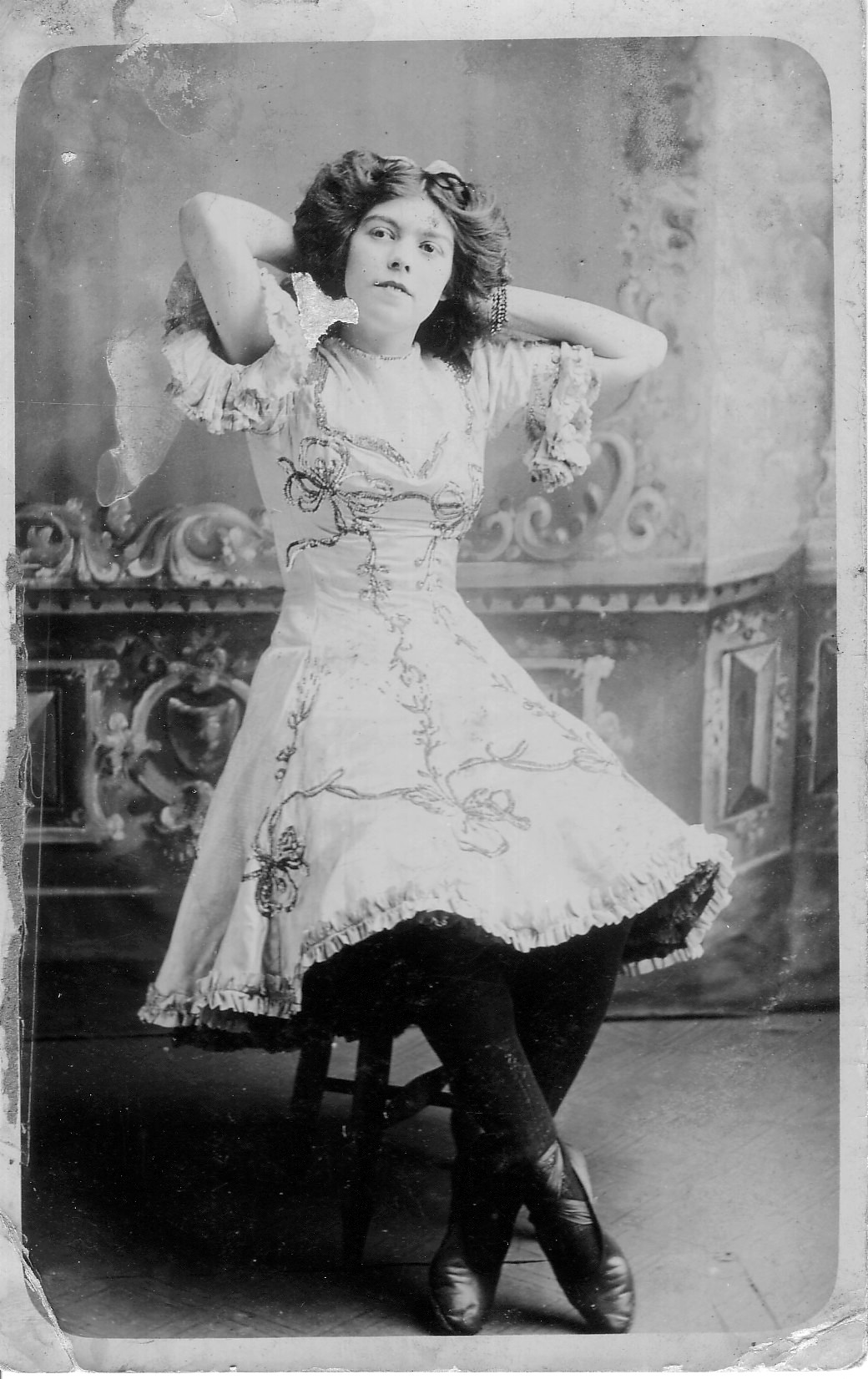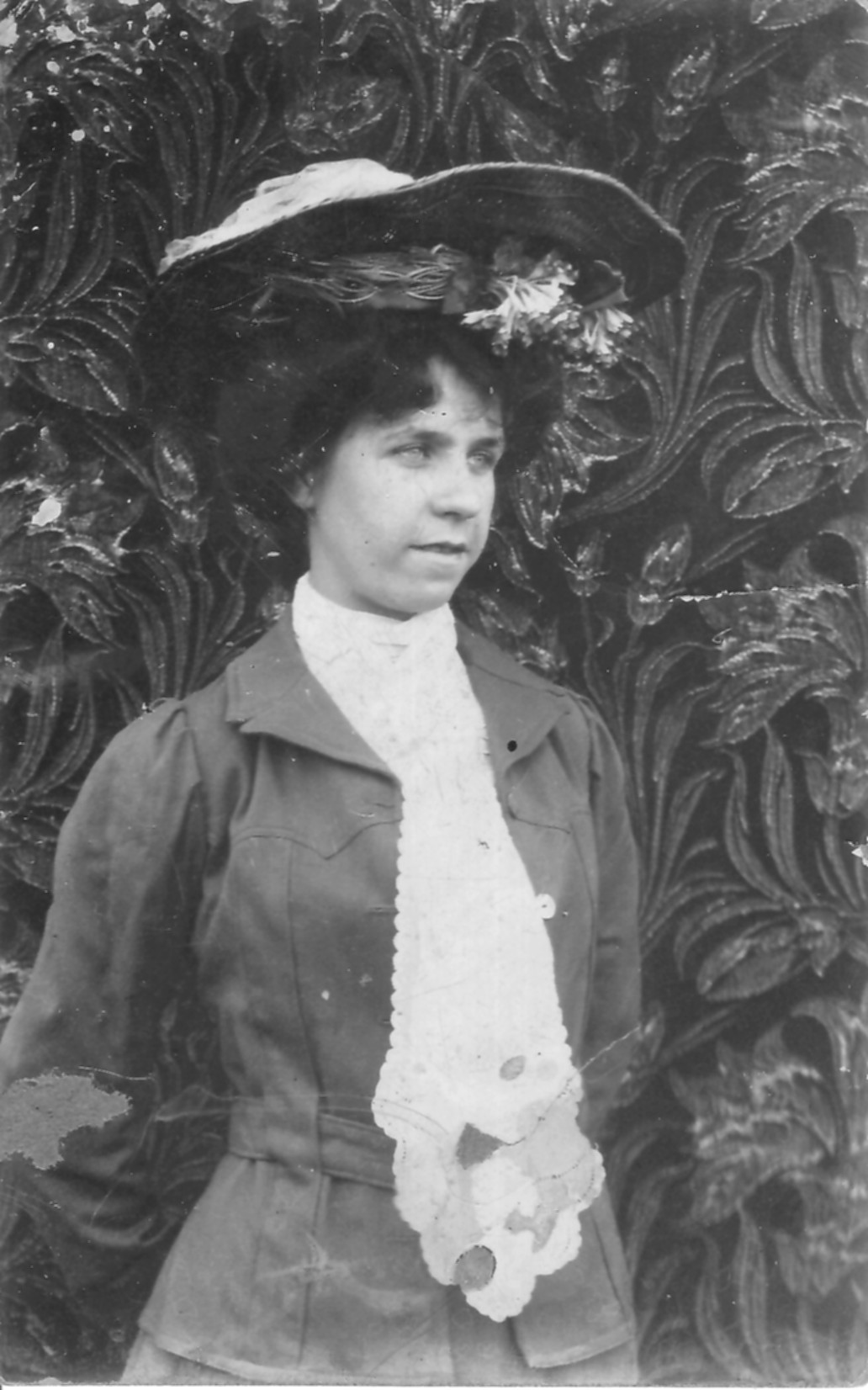William
Haggar, Fairground Film-Maker
Family Memories
During the first twenty years of their married life, William and
Sarah Haggar had eleven children. Several of their
children and grandchildrem have contributed their memories to help
write this book.
1. Will Junior (1871-1935)
Will Junior, an accomplished actor, married a London actress, Jane
Emily Silverton - her stage name was Jenny Lindon. Set up by his father
with his own theatrical company,
Will toured South Wales independently, and, with Jenny, co-operated in
the making of many of William's films, including The Poachers, A
Message from the Sea, The Sign of the Cross, The Dumb Man of Manchester,
and The Maid of Cefn Ydfa. In the 1914 version of The Maid
of Cefn Ydfa, Will's eldest daughter Jennie appears as Gwenny, Ann
Thomas' maid. Jennie's daughter Moya, who lives in Canberra, told Peter
Yorke about acting in her grandparents' company in the 1920s, and
produced "missing" pages from family memoirs.
2. Fred (1873-1913)
Perhaps overshadowed by his elder brother, Fred married Catherine
Waldron, the daughter of
a writer, in 1892, and moved away to pursue the career of a travelling
actor on his own. After Catherine's early death at Chester-Le-Street in
1906, Fred returned to South Wales, acting with Will Junior's company
in Llanelli in 1911, before his own death two years later.
3. George (1875-9)
George died shortly after having been vaccinated against smallpox:
his father vowed that no more of his children would be vaccinated.
4. Ellen Elizabeth (1877-1890)
Ellen grew up in the travelling theatre, and was becoming a fine
actress when, one morning at Chepstow, she slipped away for a paddle in
the Wye - and was never seen alive again. "Found drowned" was the
verdict on her death.
5. Jim (1879-1925)
Jim, with his younger brother Walter, helped his father make
limelight to show their first films in 1898. William took Jim into
partnership in 1899, before Jim's marriage to Kate Silverton (Jenny
Lindon's sister) in 1900. Jim acted in many of William's films, notably
as the comic tramp Tired Tim to Walter's Wearie Willie, and as The
Sheep Stealer. In 1910 he was installed as his father's first
cinema manager, at The Royalty Theatre in Llanelli, and for five years
played a prominent part there, filming local
events such as the rail riots and, with his father, The Stepney
Wedding in 1911. But his personal life was troubled - he and Kate
lost two children in 1911/12 - and in 1915 they emigrated
to Australia for a new start. Jim died there ten years later.
6. Walter (1880-1953)
The brains of the family business according to his sister Lily,
and an entertainer throughout his life, Walter took a prominent part in
all his father's affairs.
After helping with the transition to showing films, he acted in many of
them, notably
The Poachers, The Bathers' Revenge, The Life of Charles Peace ,
and many others now lost. After his marriage to Ada Roberts in 1906, he
travelled separately through South Wales with the Haggars' No. 2 Show,
until stranded at Neyland in 1915 by the requisitioning of his
showman's engine for war work. After the war, he returned to Aberdare
to take over the management of his father's cinemas there and in
Llanelli. On William's death in 1925, Walter sold up, moving first to
Bournemouth, building a new cinema in Fordingbridge, and later to
Pembroke to take over Haggar's Cinema there after Will Junior's death.
Late in the 1940's he moved to Alderholt near Fordingbridge, where, in
his last years, he composed memoirs of the family's life with the
travelling theatre, and with the Bioscope. The first of these was
published in the magazine "Dock Leaves" in 1953: the second remained in
uncorrected typescript at his death.
Walter's son Leonard followed his father in the management of Haggar's
Cinema in Pembroke,
and Leonard's son Roy, who was until his retirement a drama teacher in
Tenby, lectures on William and his films, and has preserved many of his
grandmother Ada's memories, for inclusion in the book.
7. Archie (1882-95)
Named after Archibald Carlyle, the male lead in the popular drama
"East Lynne", Archie
died of TB.
8. Rose (1885-1967)
Rose is not known to have acted in plays or films, but a
photograph shows her in short-skirted
"Paraders" costume, so she, like her younger sisters, will have shown
off her legs dancing in front of the show to entice the customers. She
married a Rhymney miner, Sid Moses, and emigrated to Australia
in the 1920's. Her grand-daughter Gloria, who lives in Queensland, gave
Peter Yorke photographs to
illustrate the book.
Picture: Auntie Rose in Parader Costume

9. Violet (1887-1979)
Peter Yorke's grandmother received no schooling. As a teenager,
she sang songs on stage, acted in the films - she can be seen as Mrs
Dyson in The Life of Charles Peace , and took the lead role
as Maria Marten in the lost film The Red Barn Crime - and in
1908 at Neath Great Fair led the paraders in front of her father's
show. She married Cyril Sydney Yorke, the son of a Forest of Dean
miner, taken on by William as his fairground barker, and remembered by
Emlyn Evans of Aberdare as supplying narration for the silent films.
"Ha! How beautifully she sleeps! Little does she know who is around the
corner. Who can it be? Why, it's the dastardly Sir Jasper!", he is
remembered as declaiming. After their marriage failed, Violet went into
service in the Forest of Dean: it was there in Coalway that her
grandson spent many happy holidays with her. After giving up her home
in 1958 because of ill-health, Violet spent her remaining years in an
old people's home in Truro, near her son Cyril.
Picture: Violet Haggar

10. Henry Percy (1889-1945)
Henry acted in some of the films, and confessed to have been a
parader, in a speech to Merthyr
Rotarians quoted at length in "The World's Fair" in 1936, providing
valuable insights into how the family lived while travelling with their
portable Bioscope show.
Henry managed various cinemas, never married, and died after a fall
from the balcony of a picture house in Birmingham.
11. Lily May (1891-1973)
Born in the coal yard at Brynmawr, and known affectionately in the
family as "Coalyard Lil",
Lily was sent for schooling to her grandmother Elizabeth Taylor in
Kilburn, returning in 1905
to play the part of Peace's boy assistant in The Life of Charles
Peace. She acted in several later films, now lost, and was a
parader. In 1912 she married Bert Richards, her father settling on her
Haggar's cinema, The Palace in Mountain Ash, where she brought up her
five children. In 1948, she went to the cinema in Rhiwbina, Cardiff, to
see Cavalcanti's compilation film celebrating the half-century of the
cinema, and recognised herself on screen in The Life of Charles
Peace, at that time erroneously ascribed to Yorkshire film-maker
Frank Mottershaw. After writing to the National Film Archive to claim
the film for her father, she spent much energy during the rest of her
life publicizing him, giving interviews, and writing a biography, based
on her brother Walter's Bioscope Recollections interspersed with her
own memories, which her daughter June typed and edited.
After Lily's death, June, who now lives in the West Country and has
shared her memories of his father and grandfather with Peter Yorke,
identified The Poachers and A Message from the Sea
as her grandfather's films. June's niece Caroline, who lives in the New
Forest, wrote an article about her great grandfather for "The Times" on
the occasion of the seventy-fifth anniversary of the cinema, and has
now given Peter Yorke photos and copies of
newspaper articles for the book.


